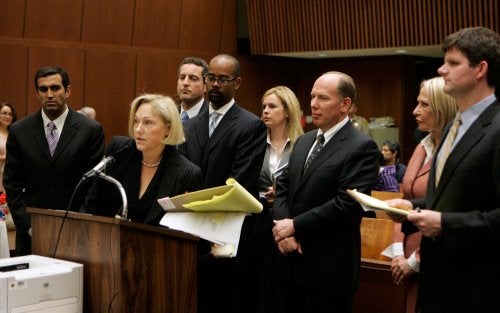When Conrad Murray appeared before a judge on Monday to hear the criminal charge against him, an entire Hollywood culture of pliant doctors and needy celebrities stood accused, too.
Michael Jackson’s case is an extreme one. Propofol injections are a long way from the semi-recreational Xanax or three.
But his example merely raises the stakes in what stands to be a landmark case pitting the law against the murky world of celebrity narcotics.
If Los Angeles prosecutors lose this one, they will have missed a rare opportunity to put a dent in Hollywood’s pill pipeline.
If they succeed, Hollywood’s Dr. Feelgoods will have good reason to think twice about writing that next prescription slip.
But history tells us that it would still be a major legal upset.
On Monday, in a courthouse surrounded by media and fans, Murray, wearing a light gray suit, sky-blue shirt and red tie, listened to the charges – and promptly denied them with a plea of not guilty. In so doing, he asserted what up until now has reliably held true: that criminal prosecution was an inappropriate response to a patient’s death at the hands of his well-meaning physician.
But the state of California, weary of growing number of celebrity prescription drug deaths, is seeking some control over a festering doctor-patient dynamic that has taken bold-faced names from Heath Ledger to Anna Nicole Smith to Danny Gans.
 Smith’s death had already brought Attorney General Jerry Brown to the dais last March, when he declared that while Californians street dealers were bad, it was really “people in white smocks and pharmacies … with their medical degrees who are a growing threat.” (The attorney general’s office did not immediately respond to TheWrap’s request for comment Monday).
Smith’s death had already brought Attorney General Jerry Brown to the dais last March, when he declared that while Californians street dealers were bad, it was really “people in white smocks and pharmacies … with their medical degrees who are a growing threat.” (The attorney general’s office did not immediately respond to TheWrap’s request for comment Monday).
The state followed up by upgrading CURES (the Controlled Substance Utilization Review and Evaluation System), its system that offers doctors the ability to track online whether they’re just another stop in a patients’ prescription carousel.
But giving doctors that additional power also gave them greater responsibility. And it did little to solve the problem of physicians who — for a brush with fame, a big payday – are happy to fulfill the narcotic wishes of the rich and famous.
Prescription overdose deaths well more than doubled from 2001 to 2005, according to the most recent available data from the Centers for Disease Control. And the National Drug Intelligence Center, a division of the Justice Department, estimates that nearly 7 million Americans are now addicted nonmedical users of prescription drugs (keep in mind this doesn’t include those addicts who have a legitimate reason for their prescriptions).
Despite the rapidly growing problem, even the most egregious cases of over-prescription have traditionally resulted in state board-certification headaches, reprimands and, at worst, license revocation.
“Doctors usually get prosecuted for giving narcotics without documentation and without examining their patients,” veteran drug-case attorney Ronald Richards told TheWrap.
In that sense, for the Los Angeles District Attorney (whose track record on celebrity cases includes one Phil Spector conviction and a fair number of spectacularly public failures), going after Murray with a manslaughter charge is a long-shot.
Since the act of administering propofol is fairly hands-on, that will make conviction all the more challenging. The state’s burden is to prove, beyond a reasonable doubt, that Murray’s methods were wildly far from the norm.
And prescribing propofol for sleep deprivation may be highly unusual, but is it a crime?
“The state can’t superimpose its own medical judgment,” Richards said. “That’s between the doctor and the patient."
MORE TO READ:
Jailing Dr. Feelgood: Prescriptions-on-Demand Gets Riskier
Dr. Feelgoods and Their Celeb Patients: Who Needs Who? (PART 2)




